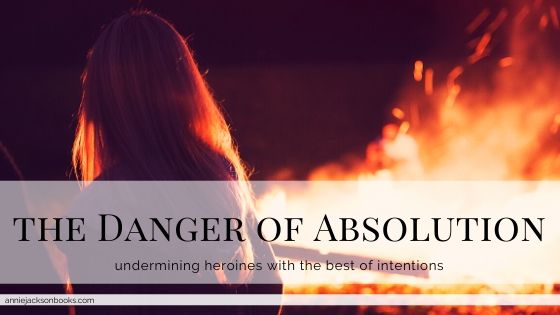So I’m reading this trilogy, and it doesn’t really matter which one because this happens all the time in YA fiction.
Something bad happens and our heroine of course blames herself. We spend half a page or more with her chastising herself–how could she have let this happen?! If only she’d been…faster or smarter or better. It’s her responsibility to help people, to save them and she’s let everyone down. oh it’s all so terrible.
And then the guy comes in, or her parents, or her best friend. They all reassure her that it’s not her fault. In fact, it’s probably his fault because it’s his job to protect her and to save her and he’s let her down. She (of course) did the right thing and she is strong and she is going to save them. It’s all ok.
The idea that she’s perfect and can’t make any mistakes drives me crazy. I hate reading again and again that nothing is her fault. And it’s not just me, well it may just be me but there is an actual problem with the whole thing.
No two problems.
Absolving her of all blame every time demands perfection.
Because the first thing they say after “it’s not your fault” is “You’re so amazing. I love you.”
Now their love is hinged on her being perfect. Her not making any dumbass moves. Her not making any seemingly good choices that totally backfire.
In order for him (or her parents or her best friend or whoever) to continue to love her, she has to be perfect. Which is not the message the author is trying to send (one would presume) but it’s the one that comes across.
In order to have strong women in fiction, our heroes have to be able to love flawed heroines. The ones who make mistakes. The ones who try their best and fail. And all the characters need to be able to acknowledge that she screwed up, and yet maybe isn’t diminished by it.
It would be so much better if they said, “Yup, that was a pretty dumbass move. I still love you.” Or, “Bad call. But it doesn’t change how I feel for you.”
We all want to grow beyond our mistakes, but pretending they didn’t happen, or that they weren’t mistakes, stifles that growth rather than fostering it.
Absolving her of guilt removes her agency.
This is maybe the most insidious. If it isn’t her choices that made everything go wrong then she doesn’t have the power to make the story go in bad directions as well as good. She is then the quintessential damsel in distress.
No matter who it is telling her it’s not her fault, what they’re really saying is you didn’t cause this. It sounds sweet, maybe, or comforting. But it’s actually quite diminishing, no matter how much they follow that with, “you’re so strong” and “you’re so capable” (which at that point just sounds like a contradiction).
It would be so much better if they said, “You can overcome this. You totally blew it, but it isn’t the end. You can correct this. You can make this better.”
Because agency is the ability to move the story–for your choices to direct the plot and the action instead of being reactionary. And if something happened, and you didn’t cause it, you’re only choice then is to react.
Which is fine every now and then. For a plot point here or there. It’s great if multiple characters have agency and sometimes she’s the cause and sometimes she’s reacting. A lot of character arc is going from a weakness into strength. But not all the time.
You want your heroine to shape the story, not be swept away by it.
The problem is when it’s never her fault. When she wallows in blame but someone is always quick to come in and absolve her it eradicates blame yes but also absolves her of strength; of being loved even in her weakness; of the agency to turn the tide of the story and thereby truly be the heroine and not the damsel.


